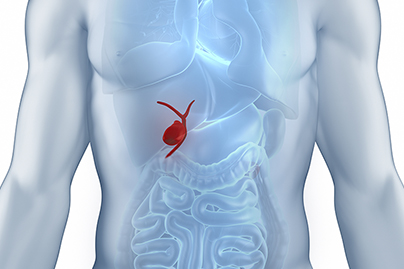Gallstones are the most common form of gallbladder disease and can lead to occasional abdominal pain after meals due to the blockage of bile outflow from the gallbladder. Gallbladder stones can also lead to chronic inflammation or even infection of the gallbladder.

The prevalence of gallstones (with or without symptoms) in the United States ranges from 5% to 9% in men and 14% to 27% in women.1 It is thought that influences of hormones in women, especially with pregnancy, contribute to the build-up of gallstones. In pregnancy, higher estrogen levels cause a higher amount of cholesterol to enter the bile in the gallbladder, and a lower progesterone causes a lower amount of bile acids in the bile and a slowing of gallbladder emptying, which all leads to a more concentrated accumulation of cholesterol in the gallbladder, forming bile stones. Other risk factors include:
So, as you can see, even though genetic and hormonal factors contribute to gallstones, there is plenty more you can do every day to help prevent and possibly reverse gallstones. A Nutritarian eating style includes the right foods that preserve normal function of the gall bladder, as well as the right balance of cholesterol in the bile. Studies, as well as my experience and recording the incidence with thousands of dieters, suggest that the risk of gallstone formation is dramatically reduced in those using a Nutritarian diet with the regular use of a small amount of nuts and seeds.
A Nutritarian diet that includes a variety of vegetables, fruits, nuts, and seeds is ideal for preventing and even treating gallstones. Be sure to include the following foods, which have been associated with a low risk of gallstone formation1 or needing gallbladder surgery:2
ONLINE: All members of DrFuhrman.com can search the Ask the Doctor archives for discussions on this topic. Platinum and Diamond members can connect with Dr. Fuhrman by posting questions in the forum. Not a member? Join now.
IN PERSON or ONLINE: Book a consultation with a specialist at Longevity Rx in San Diego, California, run by Joel Fuhrman, MD and Cara Fuhrman, ND. Using nutritional protocols, cutting-edge screening tools, advanced imaging, and innovative treatments for pain and injuries, they'll create a personalized action plan to help you prevent and recover from illness, and achieve your optimal weight. Book online at Longevity Rx or call +1 (858) 367-3558
EVENTS: Join Dr. Fuhrman for an online boot camp, detox or other event. During these immersive online events, you’ll attend zoom lectures, follow a special meal plan, and have access to a special, live Q&A session with Dr. Fuhrman. Learn more about events.
The following are sample questions from the Ask the Doctor Community Platinum and higher members can post their health questions directly to Dr. Fuhrman. (All members can browse questions and answers.)
I have had gallbladder attacks with symptoms of pain, nausea, and heartburn. I had bloodwork, an ultrasound, and a HIDA scan. These tests showed that my gallbladder is not functioning properly and should be removed. My doctor said this will not improve on its own and that surgery is my only option. My current diet is terrible, and I am very overweight. Do you think a Nutritarian diet can reverse gallbladder disease enough to avoid surgery?
Yes, I have seen people with gallbladder disease get well again. That does not mean all gallbladder pathologies are reversible. The body is a miraculous, self-healing machine once nutritional excellence is achieved. Also, we are not just talking about a gallbladder here. I am more concerned with cancer, dementia, strokes, and premature death from conventional food. Maybe this gallbladder problem will motivate you to save your own life.
I have gallbladder disease and am curious how I control the nausea I feel after eating most of my meals. I follow a Nutritarian diet pretty closely, although I probably overdo it on the nuts and seeds.
You need to limit your nuts and seeds to just one ounce per day. Gallbladder disease causes nausea that occurs after eating a high fat meal. Even with gallbladder disease, it is still important to eat nuts and seeds every day, but it should be only one ounce split so that you only have a half ounce with two of your meals.